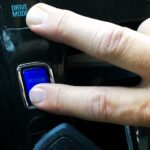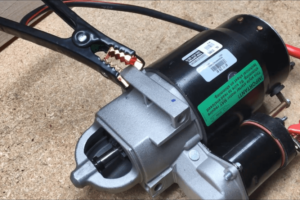Your car makes certain normal sounds when you’re driving it. However, if it makes unusual noise while turning, you need to check what’s causing it, for it could be a problem. In this article, I’ll discuss the issue of clicking noise when turning – leading causes.
If its CV joint is worn out, you will hear a clicking noise in your car while turning it. You will know if the CV joint is already bad if there’s a significant amount of play in the joint. If the play in the joint is more than 1/4 inch, you need to replace the joint.
The job of the CV joint is to allow the front wheels of your car to receive power from the engine to move forward or backward. However, if it wears out to a certain extent, this joint becomes loose, and when you turn your wheels, it will create this clicking noise.
Read on to learn more about the problem of clicking noise when you turn your wheels and its most common causes.
Main Causes of the Clicking Noise When Turning
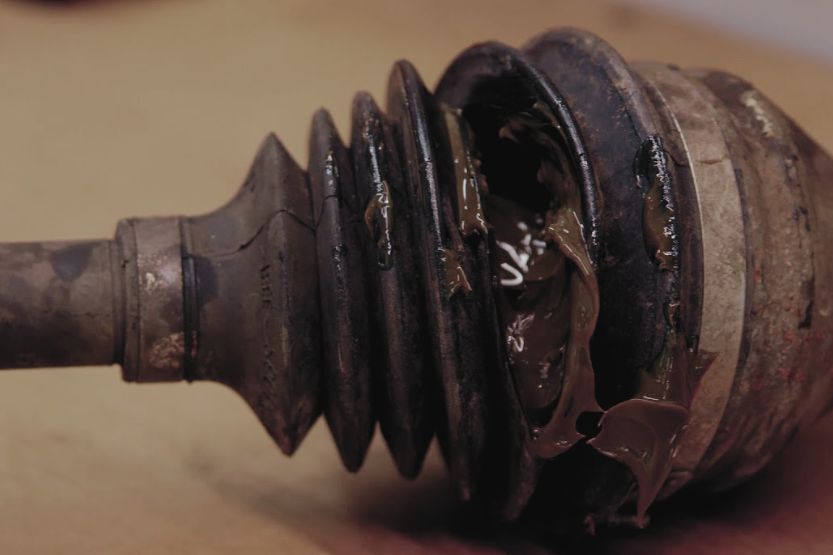
A car makes a clicking noise when turning if the CV joint has already gone bad. It is not that difficult to tell if your CV joint has already worn out. Just check the play on the joint itself. You need to replace it if it has more than 1/4 inch play.
The CV joint’s function allows your car’s front wheels to move. However, the joint parts are loosely connected if it is already damaged. So, the minute you turn your wheels, it will create a clicking noise.
You may also hear clicking and popping sounds from both ends of your front wheels. Usually, this popping sound will stop as soon as you drive straight ahead again. Most probably, the noise indicates that your CV joint at the front axle has already been damaged.
Is it still safe to drive a car creating a clicking noise when turning the steering wheel? While it is not life-threatening, you must stop using your vehicle until this issue is thoroughly checked and fixed. The noise could mean many problems that cannot be readily seen.
Your car may be experiencing several issues that can be minor or can be severe. The problems can range from a lack of engine oil to brake pads that are already loose. If it is a significant issue, it can endanger your life and your passengers.
You need to know the details what is the causes of the clicking noise when turning the steering wheel at low speed. This information will help you should you face this problem in the future.
You will be able to face this problem with confidence if you know this information. Let’s deal with them one by one:
1. Bad CV Joint
If the cause is a bad CV joint, the clicking noise will be somewhat in rhythm with the speed of your wheels. In other words, it will be rhythmic concerning the speed you drive your car. The noise will be very noticeable when the corner you turn is very sharp.
But don’t worry because your CV joint will not fail without giving you any warning. It can be a clicking noise when turning the steering wheel while stationary. Then you will hear it later on at easier and easier turns. Usually, the clicking noise will start first at tricky turns.
Later on, you will hear the clicking noise even while you are almost driving in a straight line.
If you don’t fix this issue at the right time, there’ll come a time when the joint will separate from its connections, which can make your car no longer drivable. It may also cause damage to the other parts of the suspension system.
If your car is a front-wheel drive, it has four CV joints that can go bad. Only one of them going bad will make your car non-drivable. If it is still relatively new, check its greases. Most likely, they only need re-greasing to make their clicking noises disappear.
2. Damaged Sway Bar Links
Your car most probably has a sway bar link. Its function is just what its name implies: to help control the sway of your vehicle when it is cornering. It has a couple of links on both sides, with both ends with rubber insulators.
Over time, these rubber insulators will weaken and wear out. When this happens, the link metal can contact the control arm or the sway bar. This will create a clicking sound when you turn your wheels.
To maintain the excellent condition of these sway bar links, you must inspect them regularly and check if the rubber insulators are already worn down. If it’s already damaged, you need to replace it altogether.
3. Loose Wheel Lug Nuts
The wheels of your car are held tight to their places by lugs and their holding nuts onto the brake rotors or the axles of your vehicle. Over time and as you drive your car, these lug nuts will become loose. They will allow the rims to move away from their original positions.
When this occurs, you will hear a clicking noise. To stop the clicking noise, you should return or move the lug nuts back to where they started their travel. You will need a torque wrench to tighten them again.
The degree of tightness should be from 80 to 90-foot-pounds. Don’t allow the lug nuts to loosen the rims because it will damage the edges and the studs.
4. Failed Bearing Hub
Clicking noise can also be the fault of an axle hub bearing that has failed or is failing. The function of the axle hub bearing is to carry the load of your car while allowing the wheels to rotate.
When an axle hub bearing is damaged, it will create a clicking noise when turning the steering wheel in the park or even driving straight.
If you are driving a big truck with large tires and its axle hub experiences this problem, the bearing can go out frequently. But the sound it creates can change as you turn your vehicle to the left or right.
Again, what causes clicking noise when turning? A worn-down CV joint might cause a clicking noise every time you turn. If there’s more than 1/4 inch of play, your car needs a CV joint replacement.
Why You Need to Inspect the Steering Wheel Regularly
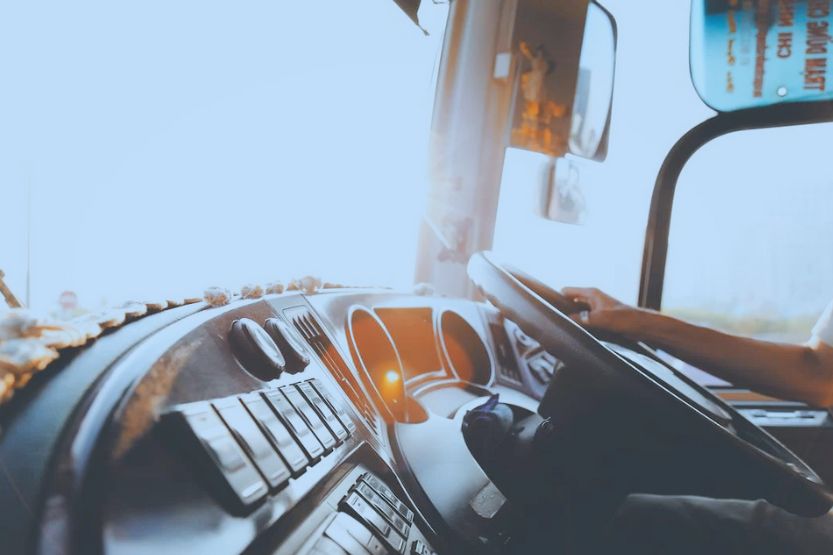
What makes turning the steering wheel easier is a pump driven by the engine that delivers high-pressure hydraulic fluid to the steering rack. However, the steering system has added components, including O-rings, hoses, and seals.
They are all used to deliver hydraulic fluid. Over time, they start to wear because of heat exposure and constant usage.
If these components work fine, you won’t find any difficulty or hear noises whenever you turn your wheels, no matter how sharp the curve is. So, the moment you hear a clicking noise or any other noise when you turn your wheels, you should be warned.
When something is wrong with the steering system, you hear these noises. A qualified mechanic is the best person to check and fix whatever the cause of the issue.
It’s better to have it checked while the noise is just the problem. Hopefully, the issue is a minor one that can be easily fixed with not so much expense.
What to Look for When You Hear a Clicking Noise
The first thing you need to look for is to find the exact spot where the clicking noise is coming from. Do you hear the clicking noise when turning right, left, front, or rear? Which way are you turning your car when this clicking noise shows up?
If it is difficult for you to pinpoint the exact location of the noise, ask a friend to help you search for it. Have them sit in the rear seat of your car so you can have a different perspective of the origin of the clicks.
Once you can determine the precise spot where the clicking noise is created, you should immediately have it analyzed and fixed so no further damage will result. However, some noises are standard, such as turn signals, emergencies, and electrical flashes.
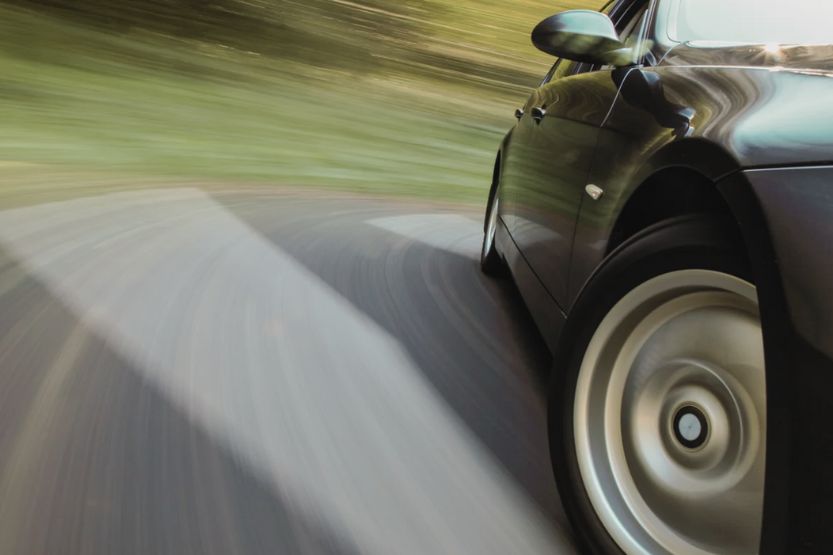
The CV joint is a critical part of your car, particularly the wheels. If you still have some questions about the clicking noises that it can create, perhaps the answers listed below will have your answer:
You likely have a damaged CV joint if you hear a clicking noise every time you turn your wheels. The noise will be especially noticeable if you are making a sharp turn.
This is where this noise usually starts. If you don’t fix this issue, you will hear this clicking noise even if you are driving in a straight line.
There are many reasons your wheels will produce clicking noises when you are turning your wheels. The most common cause is a bad CV joint. It is this component that allows your wheels to turn.
Over time, it will wear out and fail. When that happens, they become loose and create a clicking noise as you try to turn your wheels. The other causes of this issue are the following:
- Bad sway bar links
- Loose wheel lug nuts
- Damaged bearing hub
You can still drive the car, but it is safer to have it checked first by a qualified mechanic. You are not sure if the cause of the noise is a minor or a severe issue. It could be caused by just a simple lack of engine oil or as severe as a damaged CV joint or a loose brake pad.
In Closing
If you are turning your car and you hear a clicking noise, your CV joint may have already worn out. It is not hard to know if the CV joint is the culprit. Just look at the amount of play in the joint. If there is more than 1/4 inch of play in the joint, it’s time you need to replace it.
There are other causes why your wheels will create noise when you turn. But the most common cause is a damaged CV joint.

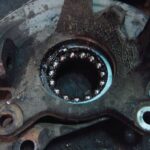

![CV Joint Noise [When Driving Straight or Turning] cv joint noise](https://roadsumo.com/wp-content/uploads/2021/06/cv-joint-noise-150x150.jpg)


